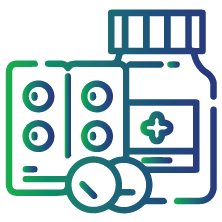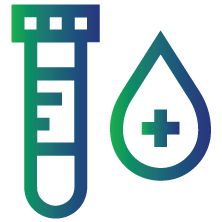
Liver Function Test
About Liver Function Test
Liver Function Tests (LFT) are blood tests to help diagnose and monitor liver diseases like hepatitis or liver damage. These tests measure the levels of certain enzymes, proteins, and bilirubin (blood waste product) to determine how well the liver is carrying out its normal functions of producing proteins and removing bilirubin. Other tests measure enzymes released by liver cells in response to liver damage or disease. Thus, getting your liver function test done is recommended to screen and monitor liver diseases.
LFT test is also known as
LFT blood test, Liver profile, LFT test, Liver panel, Liver test and Hepatic panel
Functions of Liver
The liver is considered as the chemical factory of the body as it synthesizes many enzymes and chemicals needed for the body.
· The liver has following functions:
· It produces bile to break down fats in the intestine and also carry toxins out of the body.
· It has a major role in glucose, protein and fat metabolism.
· It stores iron, for use by the body as needed.
· It regulates blood clotting and immune functions.
· It detoxifies the body by clearing out toxic and harmful substances.
Symptoms of liver disease
The symptoms of liver disease include:

Jaundice

Nausea and vomiting

Diarrhea

Stomach pain

Dark-coloured urine

Light-coloured stool

Fatigue

Loss of appetite

Swelling in the legs and ankles

Family history of liver disease
When should someone get tested?
Liver function tests can be done for many reasons including:

Screening for liver infections such as hepatitis and monitoring treatment

Monitor the progression of certain diseases such as alcoholic hepatitis and viral hepatitis

Checking the progress of liver disease or how the treatment process works for the patient

Monitoring the side effects of various medicines

Checking blood protein and enzyme levels
Test preparation
Some liver panels require fasting for up to 12 hours before the test, only drinking water during this time is recommended. Some medications can also affect the liver, so ensure your doctor is aware about what prescription drugs, over-the-counter medicines, or dietary supplements you are taking. Ask your doctor for details about pre-test preparations, and make sure to follow instructions closely.
Interpretation of results
|
Parameters |
Normal liver function test values |
|
Alanine Aminotransferase (ALT) |
13 - 69 U/L |
|
Aspartate Aminotransferase (AST) |
15 - 46 U/L |
|
Alkaline phosphatase (ALP) |
38 - 126 U/L |
|
Total Serum Protein |
5.5 - 8.0 g/L |
|
Albumin |
3.5 - 5.0 g/L |
|
Globulin |
2.0 - 3.5 g/L |
|
Total Bilirubin |
0.0 - 1.1mg/dL |
|
Conjugated bilirubin (direct) |
0.0 - 0.3mg/dL |
|
Unconjugated bilirubin (indirect) |
0.0 - 1.1mg/dL |
|
Gamma-glutamyl transferase (GGT) |
9 - 48 U/L |
|
L-lactate dehydrogenase (LD) |
100-280 U/L |
|
Prothrombin time (PT) |
The normal range for PT results (not on blood thinning medicines) is: · 11 - 13.5 seconds · INR of 0.8 - 1.1
On blood thinners · INR of 2.0 - 3.0
|
Deviation from normal levels indicates the following:
· A higher ALT test result than normal can be a sign of liver damage. Very high levels are most often caused by viral hepatitis, ischemic hepatitis, or injury from drugs or other chemicals.
· A high result of AST may be because of a problem with your liver or muscles. Elevated AST without elevated ALT may indicate heart or muscle disease. If ALT, bilirubin, and ALP are also elevated, it may indicate liver damage.
· Elevated levels of ALP may be a sign of liver inflammation, blockage of the bile ducts, or bone disease.
· A low albumin test result may indicate that the liver is not functioning properly. This occurs in diseases such as cirrhosis of the liver, malnutrition, and cancer.
· A high bilirubin test result may indicate that the liver is not functioning properly. Elevated bilirubin levels with elevated ALT or AST levels may indicate cirrhosis or hepatitis.
· A high GGT test result may indicate damage to the liver or bile ducts.
· Elevated levels of LD or PT may indicate liver damage.
FAQs
What is the turnaround time (TAT) for the results of a liver function test?
Test results of a liver function test may take a few hours to a day, although it could take longer at times.
What are the risks associated with a liver function test?
This test involves negligible risk of infection. There might be slight bruising or tenderness around the site where the needle is inserted.
What are the limitations of a liver function test?
Although they are mostly accurate, several factors can affect the results of liver function tests. For example, harmful substances like drugs or alcohol, or immune conditions can cause the liver to become inflamed and damage the liver cells, leading to abnormal results from LFT. If the bile drainage from the liver is blocked due to gallstones it may also affect the LFT results
What should you do if you have an abnormal liver function test result?
An abnormal liver function test result may be due to liver disease or damage. These results are used to help diagnose your condition or determine appropriate treatment for you. In some cases, these blood tests are not enough to diagnose a specific liver disease, and require further tests, like imaging tests, a liver biopsy or blood tests for certain viruses to help make a final diagnosis. Your healthcare provider will decide on a suitable treatment plan for you based on your diagnosis
5. How to keep your liver healthy?
You can maintain your liver health by limiting alcohol intake, reducing consumption of dietary fats, not consuming unnecessary drugs, making sure all tattoos and piercings are performed in a sanitary manner and getting vaccinated for hepatitis A or B when required.

